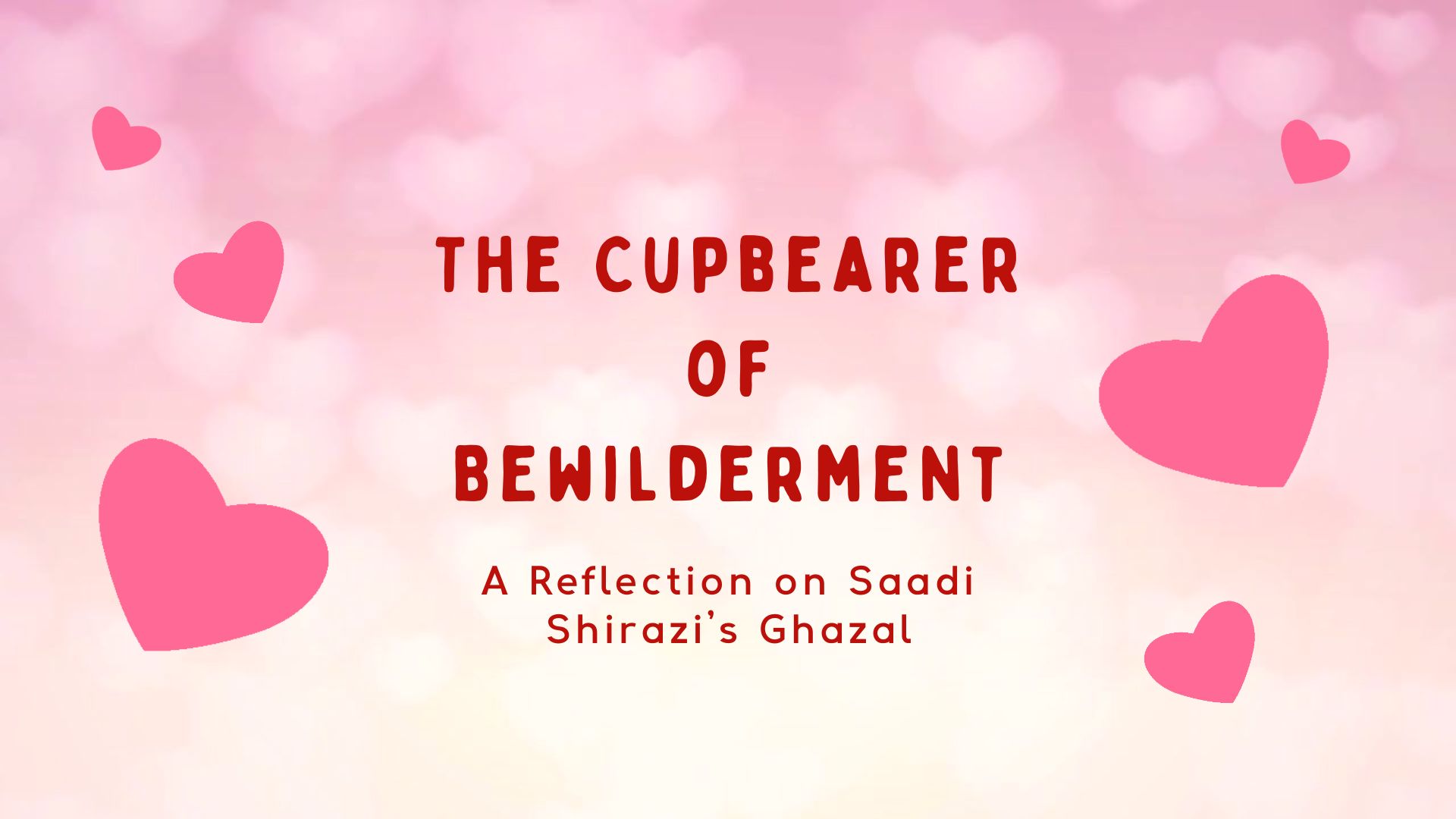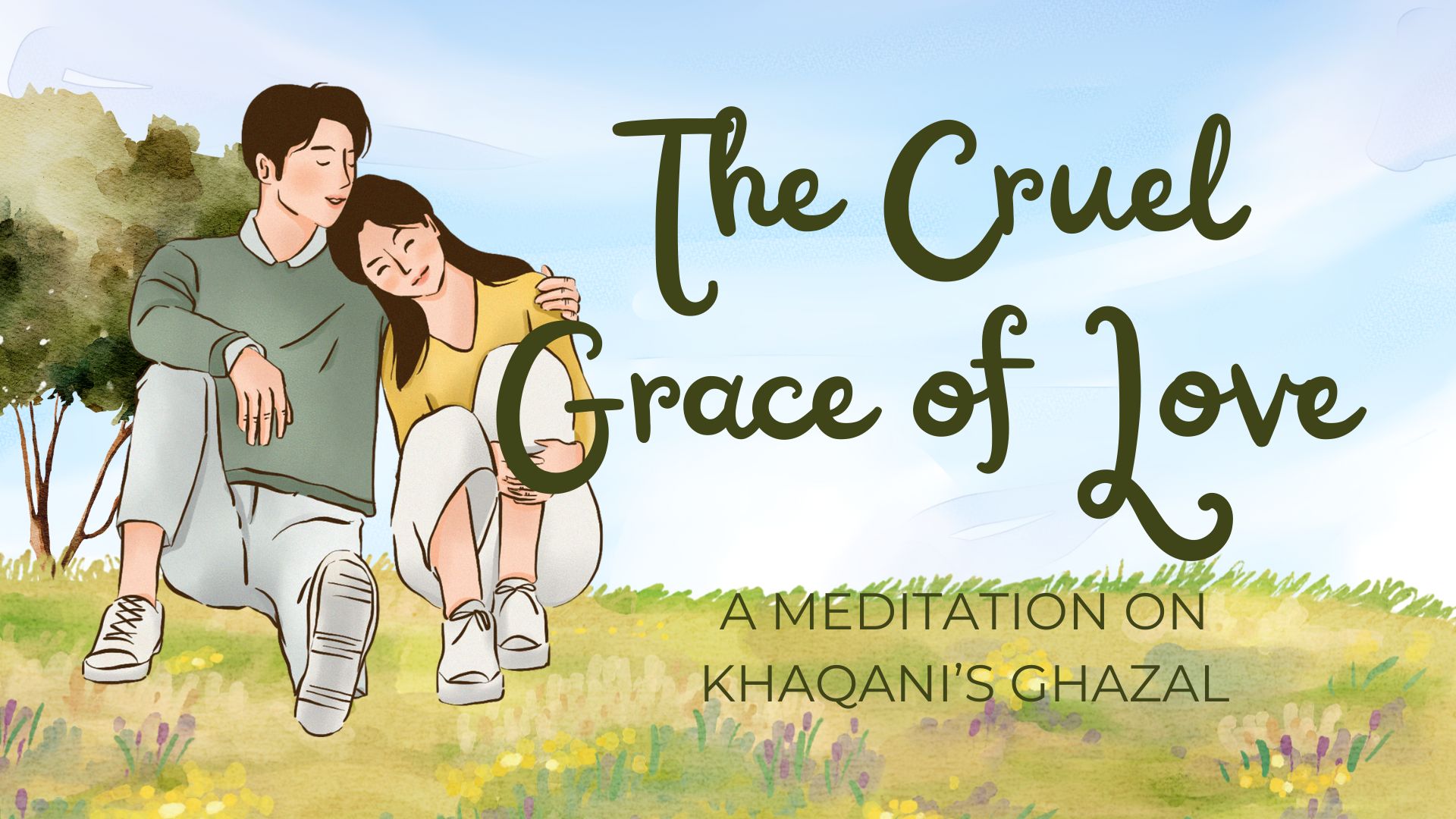This ghazal by Saadi Shirazi is a luminous example of how the Persian masters weave together sensual beauty and spiritual symbolism until the two become indistinguishable.
چه دلها بردی ای ساقی به ساق فتنهانگیزت
دریغا بوسهْ چندی بر زنخدان دلاویزت
خدنگ غمزه از هر سو نهان انداختن تا کی
سپر انداخت عقل از دست ناوکهای خونریزت
برآمیزی و بگریزی و بنمایی و بربایی
فغان از قهر لطفاندود و زهر شِکَّرآمیزت
لب شیرینت ار شیرین بدیدی در سخن گفتن
بر او شکرانه بودی گر بدادی ملک پرویزت
جهان از فتنه و آشوب یک چندی برآسودی
اگر نه روی شهرآشوب و چشم فتنهانگیزت
دگر رغبت کجا ماند کسی را سوی هشیاری
چو بیند دست در آغوش مستان سحرخیزت
دمادم درکش ای سعدی شراب صرف و دم درکش
که با مستان مجلس درنگیرد زهد و پرهیزت
English translation of Saadi Shirazi’s ghazal:
O Cupbearer, how many hearts you’ve stolen
With the seduction of your enchanting glance!
Alas, how many kisses have been lost,
Upon the sweetness of your beguiling chin.
How long will you go on,
Casting secret arrows from every side?
Reason has thrown away its shield,
Before the bloodletting darts of your eyes.
You come near and then flee,
You reveal yourself and then you steal away —
Alas for your kindness veiled in cruelty,
Your poison blended with the taste of sugar!
If the sweetness of your lips were known
When you spoke,
King Parviz himself would offer thanks,
And gladly give away his throne to you.
The world might rest from turmoil for a while,
If not for your city-disturbing face,
And your gaze that stirs the seeds of chaos.
Who could still desire sobriety,
When they see the early-rising drunkards
Resting in the circle of your arms?
Drink, Saadi — drink again, sip after sip,
For in the gathering of the intoxicated,
There is no place for restraint or piety.
There are some faces, some presences, that do not merely enter your life — they overtake it.
They do not ask permission. They arrive as storm or dawn, and all the careful walls within you — the calm, the logic, the restraint — collapse before their radiance.
Saadi, in this ghazal, speaks to that presence — half beloved, half divine mystery — who conquers hearts with a single glance, who awakens the dormant longing that has slept beneath reason.
He begins with admiration, almost disbelief:
“What hearts you have stolen, O Cupbearer, with your enchanting glance!
Alas, how many kisses have been lost upon your alluring chin!”
It is not mere flattery. It is the astonishment of a soul who has seen something it cannot name. The cupbearer is not simply a beautiful youth — it is the face of Beloved Beauty itself, the reflection of divine allure that shines through human form.
Each heart it touches is set aflame; each reason is undone.
The Wound of the Glance
“How long will you go on casting secret arrows from your eyes?
Reason has thrown down its shield before your bloodletting glances.”
Love begins in the eyes. Not just because we see the beloved — but because the beloved sees us. That gaze, that sudden recognition, is not merely attraction; it is exposure. It unveils the parts of us we did not know were waiting to be seen.
Reason, when struck by such a gaze, finds itself defenseless. The intellect cannot negotiate with beauty — it can only surrender.
Saadi’s “bloodletting glance” is both wound and grace. The beloved’s eyes do not kill — they awaken. They pierce through the outer layers until the soul itself trembles. Reason, realizing it has met something vaster than thought, lays down its arms.
Love begins where understanding ends.
The Sweetness of Cruelty
“You mix and vanish, reveal and steal away —
Ah, the pain of your kindness masked with cruelty, your poison mixed with sugar!”
In the language of Persian mysticism, the Beloved is never constant. The divine presence appears, dazzles, and disappears — leaving the lover bewildered, half mad, searching through the ashes of ecstasy.
And yet, Saadi does not accuse. He marvels.
For in that endless play — of showing and hiding, of union and separation — love reveals its deepest lesson: that longing is the true teacher.
The sweetness of presence is only known through the bitterness of absence.
The kiss is treasured because it vanishes.
Every revelation demands a veil to protect it.
What Saadi calls “poison mixed with sugar” is the paradox at the heart of divine love:
the same force that intoxicates also burns;
the same gaze that blesses also wounds.
The lover’s joy and suffering are not opposites — they are twins born of the same light.
The Honeyed Tongue
“If the sweetness of your lips were known in speech,
King Parviz himself would offer his throne in gratitude.”
Saadi’s metaphor is deliberately extravagant. Parviz, the legendary Persian king, symbolizes earthly glory and possession — everything the world calls “enough.”
And yet, even such a monarch would abandon his crown for a single taste of the Beloved’s speech.
This is not about human lips alone.
It is about the voice of creation itself — the music of the universe that whispers through beauty, poetry, and breath.
To hear the Beloved speak — even once — is to realize that every word before it was an echo.
When beauty speaks, truth becomes sound.
The world itself was born from that first utterance: “Be.”
The City of Turmoil
“The world might rest from turmoil for a while,
if not for your city-disturbing face and your chaos-stirring eyes.”
What a line!
Even creation trembles before beauty.
Saadi calls the Beloved’s face city-disturbing — not out of blame, but reverence. For true beauty cannot exist quietly. It rearranges the world around it; it unsettles order, breaks the sleep of complacency.
When beauty enters, peace must make room for passion.
And passion, as every lover knows, is divine disturbance — the soul’s refusal to remain numb.
The mystics understood this: God is not merely peace — God is also ecstasy, movement, fire. The Beloved’s face destroys so that something new may be born.
The Dawn of Intoxication
“Who could ever care for sobriety,
having seen the dawn-lit hands of your early-rising drunkards?”
Here, Saadi turns playful — but beneath the play lies revelation.
He speaks of those who wake early not for prayer or work, but for wine. Yet this is no ordinary intoxication.
The “drunkards of dawn” are mystics — lovers who rise before the world wakes to taste the wine of remembrance.
When you have felt the sweetness of divine nearness, when you have glimpsed the face behind all faces — how can you return to ordinary sobriety?
What the world calls madness, the mystic calls awakening.
For true sanity is not in control — it is in surrender.
Saadi’s beloved is both human and divine: a figure whose touch makes one forget reason, whose presence makes one long for union beyond form. The “hand of the early drunkard” is the soul reaching toward light, trembling yet fearless, ready to lose itself completely.
The Final Invitation
“Drink, Saadi, drink — sip after sip —
for in the company of the intoxicated, there is no place for restraint and piety.”
Here lies Saadi’s final command — both joyous and daring.
He calls himself by name, as if speaking to his own soul:
Stop holding back. Let go of the pretense of control.
Drink deeply from the cup of love, even if the world calls you a sinner.
Piety without passion is dry soil; love without madness is only habit.
The Beloved calls not for moderation, but for wholeness — for the kind of surrender that leaves nothing outside the circle of divine love.
In Saadi’s world, intoxication is not vice — it is vision.
It is the state in which the veil thins, the ego dissolves, and the soul remembers what it truly is:
a spark of the infinite longing to return to its source.
The wine Saadi drinks is the wine of being — the sacred current that runs through every heart, whispering, “Lose yourself — and you shall find Me.”
The Divine as Beloved
Throughout the poem, the beloved remains ambiguous — at once a youth with enchanting beauty and the embodiment of the Eternal.
This is the genius of Persian mysticism: to see no separation between divine beauty and earthly beauty.
Every curve of the face, every gleam of the eye, is a mirror of something beyond.
The lover’s yearning for the beloved is the soul’s yearning for God — though the lover may not know it.
Saadi’s winehouse is a temple. His intoxication, a prayer.
His cupbearer, a guide whose cruelty and tenderness are one.
When he says, “Drink, Saadi,” he is not calling himself to sin — he is calling himself to wakefulness.
For only when reason sleeps can the heart truly hear.
Love Beyond Logic
What unites Saadi with Hatef and Khaqani is this:
each finds in love the doorway to the sacred.
They begin with passion and end with revelation.
They begin with the face of the beloved —
and discover, within that face, the reflection of the Infinite.
In Saadi’s ghazal, the path is neither ascetic nor moralistic.
It is the path of living fully — of letting beauty strike the heart, letting longing purify it, letting surrender transform it.
His final counsel — “Drink, Saadi” — is a call to every soul afraid to lose control.
Do not fear the wine of love; it is not forgetfulness, but remembrance.
What you lose is illusion. What you gain is eternity.
The Mystery of the Cup
And so the poem closes where it began: with the cupbearer.
He who poured the first wine now pours the last.
But between the two cups, a transformation has occurred —
the lover who once begged for a kiss now asks only for union.
The intoxication that began in desire ends in awareness.
For the mystic, the Cupbearer is both the giver and the gift, the question and the answer.
To be drunk on love is not to escape the world,
but to see it as it truly is —
a shimmering reflection of divine play,
where every glance, every heartbreak, every joy
is but another sip from the endless cup.
Epilogue: Saadi’s Whisper
Somewhere in the dawn, Saadi’s voice still echoes —
half laughter, half prayer:
“Drink, O friend, drink again,
for reason cannot enter the tavern of love.
Only those who have been wounded
may taste the sweetness of the wine.”
This is not a poem of indulgence; it is a poem of awakening.
To drink the wine of love is to taste life fully — its pain, its beauty, its transience, its wonder.
To let go of control, to dissolve in presence, to love without defense.
That is Saadi’s invitation.
That is the secret hidden behind the beloved’s smile.
And perhaps, as Saadi knew,
the only true act of worship
is to raise the cup — and say yes.





